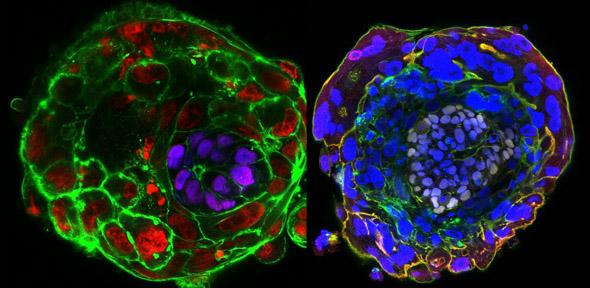
A novel, inexpensive method for detecting the Zika virus could help slow spread of outbreak, and potentially other future pandemic diseases
An international, multi-institutional team of researchers led by synthetic biologist James Collins, Ph.D., at the Wyss Institute for Biologically Inspired Engineering at Harvard University, has developed a low-cost, rapid paper-based diagnostic system for strain-specific detection of the Zika virus, with the goal that it could soon be used in the field to screen blood, urine, or saliva samples.
“The growing global health crisis caused by the Zika virus propelled us to leverage novel technologies we have developed in the lab and use them to create a workflow that could diagnose a patient with Zika, in the field, within 2-3 hours,” said Collins, who is a Wyss Core Faculty member, and Termeer Professor of Medical Engineering & Science and Professor of Biological Engineering at the Massachusetts Institute of Technology (MIT)’s Department of Biological Engineering.
Building off previous work done at Harvard’s Wyss Institute by Collins and his team, along with collaborators from Massachusetts Institute of Technology (MIT), the Broad Institute of Harvard and MIT, Harvard Medical School (HMS), University of Toronto, Arizona State University (ASU), University of Wisconsin-Madison (UW-Madison), Boston University (BU), Cornell University, and Addgene, joined their efforts to quickly prototype the rapid diagnostic test and describe their methods in a study published online May 6 in the journal Cell, all within a matter of six weeks. Collins is the paper’s corresponding author.
Emerging innovation during the Ebola health crisis
In October 2014, Collins’ team developed a breakthrough method for embedding synthetic gene networks — which could be used as programmable diagnostics and sensors – on portable, small discs of ordinary paper.
Stirred by the then-ongoing Ebola outbreak in Africa, they demonstrated a proof-of-concept color-changing diagnostic that could screen for Ebola by embedding in paper a novel kind of synthetic biomolecular sensor designed to screen for specific RNA sequences. These RNA sequences can mark not only the genetic signatures of Ebola but also other RNA viruses including Zika, SARS, measles, influenza, hepatitis C, and West Nile fever. The team believed that one day, the method could be applied in the field to identify viruses with blood, urine, or saliva samples.
However, until recently, the team’s paper-based technology has been challenged by the extremely low concentration of virus that is normally found in blood, urine, and saliva. Now, using blood samples from monkeys infected with Zika virus as well as virus recovered from cells infected in the laboratory, the team has validated a next generation technique that overcomes this problem.
A leap for paper-based diagnostics, urged by the Zika outbreak
“The vivid images in the news stemming from the ongoing Zika crisis are heartbreaking,” said Keith Pardee, Ph.D., one of the study’s co-first authors and an Assistant Professor in the Leslie Dan Faculty of Pharmacy at University of Toronto, who was formerly a Postdoctoral Fellow at the Wyss Institute and BU. “We hope a tool like this can help reduce the impact of the outbreak until a vaccine can be developed.”
With field use in mind, Collins’ team designed a simple modular workflow comprising three steps: amplification, Zika detection, and CRISPR-Cas9-aided strain identification. CRISPR-Cas9, a gene editing mechanism derived from the immune systems of bacteria, can be used to search entire sequences to find exclusive genetic markers. Leveraging CRISPR-Cas9’s talent for sequence recognition, the third part of the team’s system uses a CRISPR-Cas9-aided paper-based diagnostic to discriminate between strains whose genetic profiles differ by as little as one nucleotide.
Learn more: Finding Zika one paper disc at a time
The Latest on: Zika
[google_news title=”” keyword=”Zika” num_posts=”10″ blurb_length=”0″ show_thumb=”left”]
via Google News
The Latest on: Zika
- Enhancing Health Communication for Epidemic Preventionon April 27, 2024 at 9:56 am
Effective public health communication is essential for Africa, confronted with numerous infectious disease epidemics and public health crises.
- Improving public health communication in African epidemics: Lessons learned and future directionson April 26, 2024 at 10:20 am
Zika and other public health emergencies, effective communication of public health messages is crucial to control the spread of disease, maintain public trust, and encourage compliance with health ...
- New type of host defence against Zika, dengue infections revealedon April 23, 2024 at 5:00 pm
Research explains why some viruses present in bodily fluids don't spread through those fluids, revealing a novel defense mechanism against viral infection.
- DNA vaccine against Zika performs well in tests on miceon April 18, 2024 at 9:47 am
In Brazil, researchers at the University of São Paulo (USP) and the Pernambuco division of Oswaldo Cruz Foundation (FIOCRUZ) are developing a Zika vaccine. The formulation was tested on mice and found ...
- DNA vaccine against zika performs well in tests on miceon April 18, 2024 at 9:29 am
In Brazil, researchers at the University of São Paulo (USP) and the Pernambuco division of Oswaldo Cruz Foundation (FIOCRUZ) are developing a zika vaccine. The formulation was tested on mice and ...
- After coming up short in COVID, Valneva focuses on chikungunya vaccine launchon April 18, 2024 at 9:02 am
Thomas Lingelbach, CEO of French vaccine specialist Valneva, said that the company is focused on launching its newly approved shot for the chikungunya virus and on developing a second-generation ...
- Zika Rash: Everything You Need to Knowon April 17, 2024 at 11:56 am
The rash is made up of small, red dots, but not all patients experience it Medically reviewed by Brendan Camp, MD Zika rash is one of the main symptoms of Zika virus, an infection spread by ...
- Zika Rash: Everything You Need to Knowon April 17, 2024 at 11:56 am
Zika is diagnosed through a blood or urine test. If you believe you have Zika, you should reach out to your healthcare provider. You should also let them know if you have symptoms, including Zika rash ...
- WHO spokesperson raises concerns over growing threat of mosquito-borne illness: 'Their detection by healthcare systems [is] quite challenging'on April 16, 2024 at 3:00 am
Though there has been a global reduction in cases since the virus peaked in 2017, it now has reached 89 countries. WHO spokesperson raises concerns over growing threat of mosquito-borne illness: ...
- Zika Viruson March 27, 2024 at 5:01 pm
The Zika virus causes fever, joint pain, headaches, a rash, conjunctivitis and muscle pain. As with other viruses, it is characterised by spreading via the cells of the body. Both men and women ...
via Bing News










